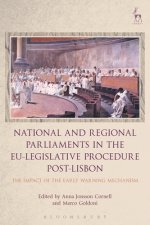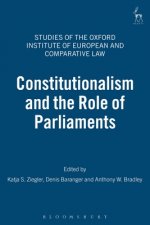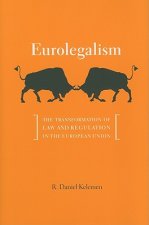
Kód: 04532962
Delegating Rights Protection
Autor David Erdos
Delegating Rights Protection explores bill-of-rights outcomes in four "Westminster" countries - Australia, Canada, New Zealand, and the United Kingdom - whose development exhibit an interesting combination of both commonality and ... celý popis
- Jazyk:
 Angličtina
Angličtina - Vazba: Pevná
- Počet stran: 270
Nakladatelství: Oxford University Press, 2010
- Více informací o knize

Mohlo by se vám také líbit
Dárkový poukaz: Radost zaručena
- Darujte poukaz v libovolné hodnotě a my se postaráme o zbytek.
- Poukaz se vztahuje na celou naši nabídku.
- Elektronický poukaz vytisknete z e-mailu a můžete ihned darovat.
- Platnost poukazu je 12 měsíců od data vystavení.
Více informací o knize Delegating Rights Protection
Nákupem získáte 491 bodů
 Anotace knihy
Anotace knihy
Delegating Rights Protection explores bill-of-rights outcomes in four "Westminster" countries - Australia, Canada, New Zealand, and the United Kingdom - whose development exhibit an interesting combination of both commonality and difference. Comparative analysis of some thirty-six democracies demonstrates that the historic absence of a bill of rights in Westminster countries is best explained by, firstly, the absence of a clear political transition and, secondly, their strong British constitutional heritage. Detailed chapters then explore recent and much more diversified developments. In all the countries, postmaterialist socio-economic change has resulted in a growing emphasis on legal formalization, codified civil liberties, and social equality. Pressure for a bill of rights has therefore increased. Nevertheless, by enhancing judicial power, bills of rights conflict with the prima facie positional interests of the political elite. Given this, change in this area has also required a political trigger which provides an immediate rationale for change. Alongside social forces, the nature of this trigger determines the strength and substance of the bill of rights enacted. The statutory Canadian Bill of Rights Act (1960), New Zealand Bill of Rights Act (1990), and the Human Rights Act (UK) (1998) were prompted politically by a relatively weak and backward-looking 'aversive' reaction against perceived abuses of power under the previous administration. Meanwhile, the fully constitutional Canadian Charter (1982) had its political origins in a stronger, more self-interested and prospective need to find a new unifying institution to counter the destabilizing, centripetal power of the Quebecois nationalist movement. Finally, the absence of any relevant political trigger explains the failure of national bill of rights initiatives in Australia. The conclusionary section of the book argues that this Postmaterialist Trigger Thesis (PTT) explanation of change can also explain the origins of bills of rights in other internally stable, advanced democracies, notably the Israeli Basic Laws on human rights (1992).
 Parametry knihy
Parametry knihy
Zařazení knihy Knihy v angličtině Law Laws of Specific jurisdictions Constitutional & administrative law
4911 Kč
- Plný název: Delegating Rights Protection
- Podnázev: The Rise of Bills of Rights in the Westminster World
- Autor: David Erdos
- Jazyk:
 Angličtina
Angličtina - Vazba: Pevná
- Počet stran: 270
- EAN: 9780199557769
- ISBN: 0199557764
- ID: 04532962
- Nakladatelství: Oxford University Press
- Hmotnost: 578 g
- Rozměry: 241 × 162 × 24 mm
- Datum vydání: 05. August 2010
Oblíbené z jiného soudku
-

Equal Rights Handbook
298 Kč -

Matter of Interpretation
465 Kč -

Constitution of the United States of America with the Declaration of Independence
301 Kč -

Human Rights, Ownership, and the Individual
2964 Kč -

America's Unwritten Constitution
581 Kč -

Age of Dignity
3635 Kč -

Federalist Papers
223 Kč -

Federalist Papers
361 Kč -

Art of the Advocate
410 Kč -

Law of Public and Utilities Procurement Volume 2
9418 Kč -

EU Constitutional Law
1003 Kč -

Cyberwar
534 Kč -

Federalism: A Very Short Introduction
269 Kč -

Anti-Federalist Papers and the Constitutional Convention Debates
175 Kč -

European Convention on Human Rights
13902 Kč -

Gabby Petito's Story
274 Kč -

Proportionality
2010 Kč -

Magna Carta
357 Kč -

Framers' Coup
634 Kč -

Theory of Interpretation of the European Convention on Human Rights
1929 Kč -

Application of the Principle of Subsidiarity in Eu Law
1506 Kč -

Power of Persuasion
1024 Kč -

Privacy: A Very Short Introduction
269 Kč -

Commentaries on the Constitution of the United States Vol. III (in three volumes)
871 Kč -

Gunfight
455 Kč -

Staats- und Verwaltungsrecht Nordrhein-Westfalen
604 Kč -

Civil Liberties & Human Rights
1488 Kč -

Rewriting Children's Rights Judgments
4450 Kč -

Beginning Constitutional Law
1300 Kč -

Raised Right
848 Kč -

Constitutional and Administrative Law
1250 Kč -

Legitimate Expectations and Proportionality in Administrative Law
4450 Kč -

Theory and Practice of the European Convention on Human Rights
6712 Kč -

Corporate Counsel Survival Guide
1889 Kč -

ISO 37001
511 Kč -

Fundamental Rights and Principles
4186 Kč -

Data Privacy Law
5652 Kč -

Enterprise of Law
561 Kč -

Anatomy of Human Rights in Israel
3152 Kč -

Constitution of the United States of America and the Constitution of the Confederate States of America
296 Kč -

National and Regional Parliaments in the EU-Legislative Procedure Post-Lisbon
4450 Kč -

Rule of Law in the European Union
3635 Kč -

Federalist
403 Kč -

Legislation in Europe
5541 Kč -

Constitutionalism and the Role of Parliaments
3962 Kč -

Emerging Constitutional Law of the European Union
1681 Kč -

European Convention on Human Rights
1691 Kč -

Nature of Legislative Intent
3355 Kč -

Law and Administration
2976 Kč
Osobní odběr Praha, Brno a 12903 dalších
Copyright ©2008-24 nejlevnejsi-knihy.cz Všechna práva vyhrazenaSoukromíCookies





 Vrácení do měsíce
Vrácení do měsíce 571 999 099 (8-15.30h)
571 999 099 (8-15.30h)